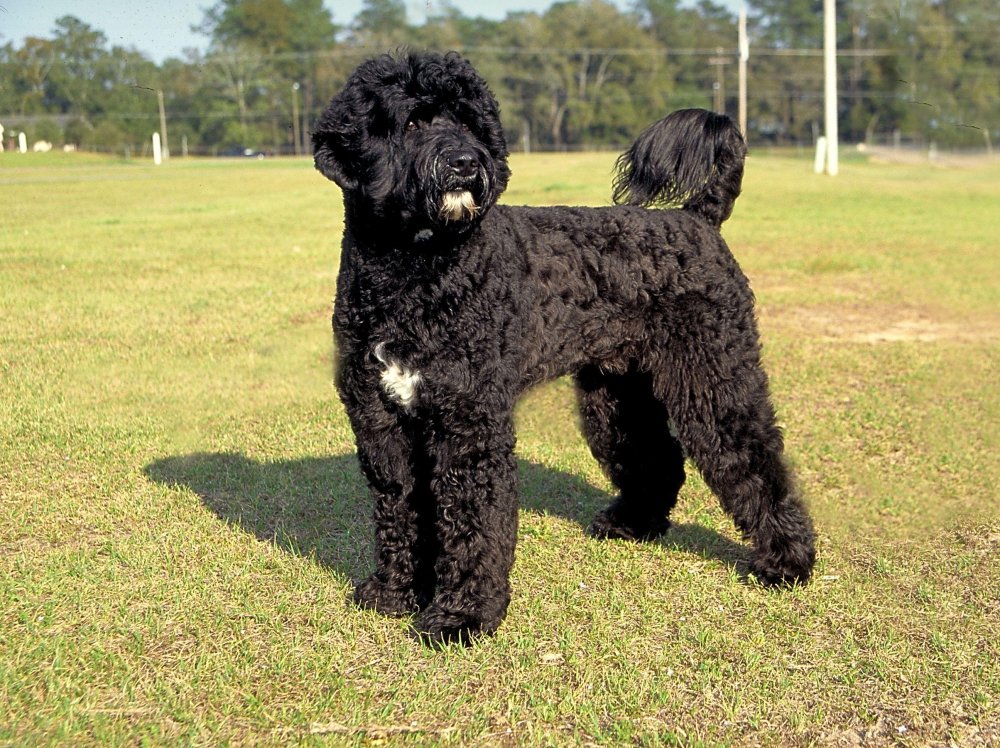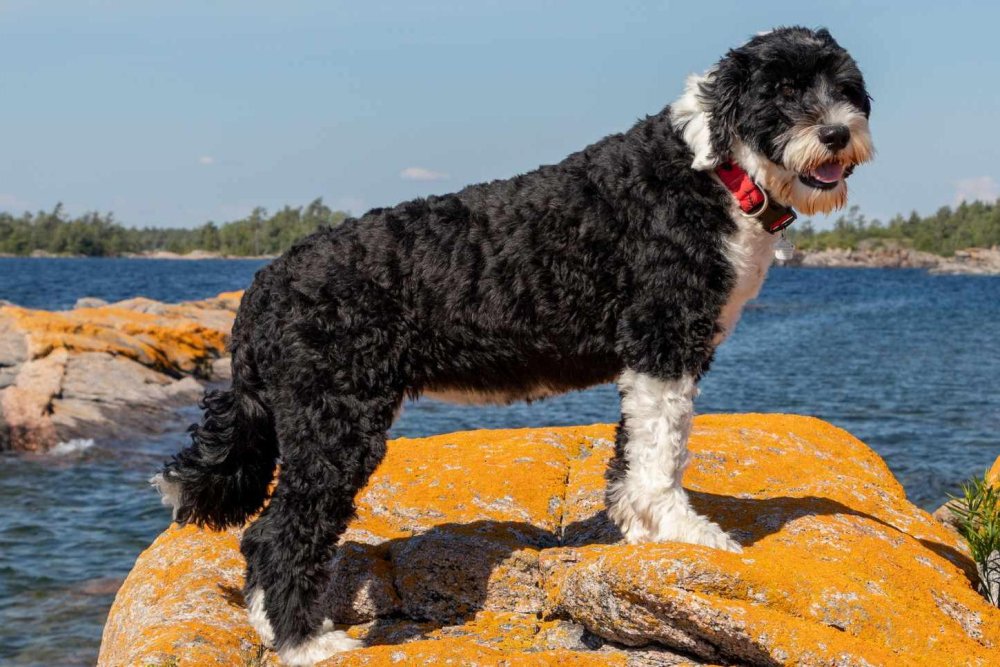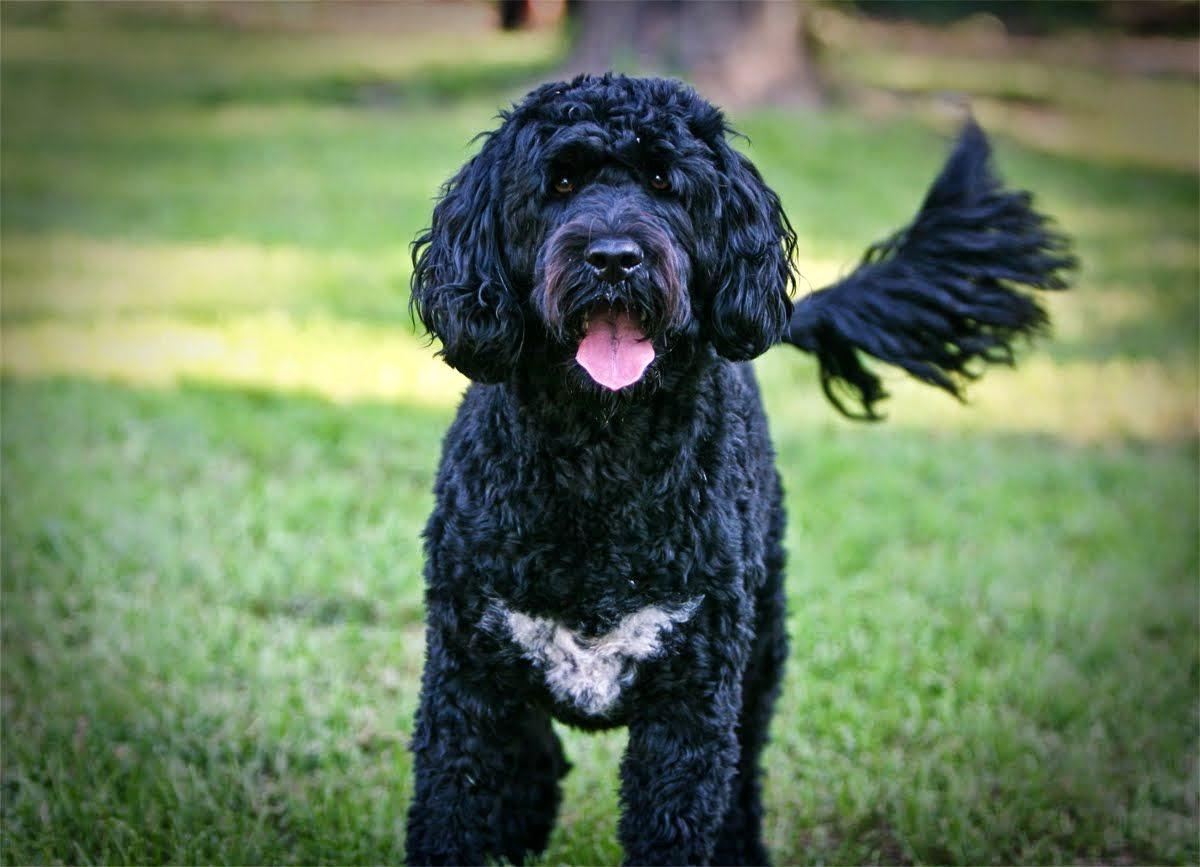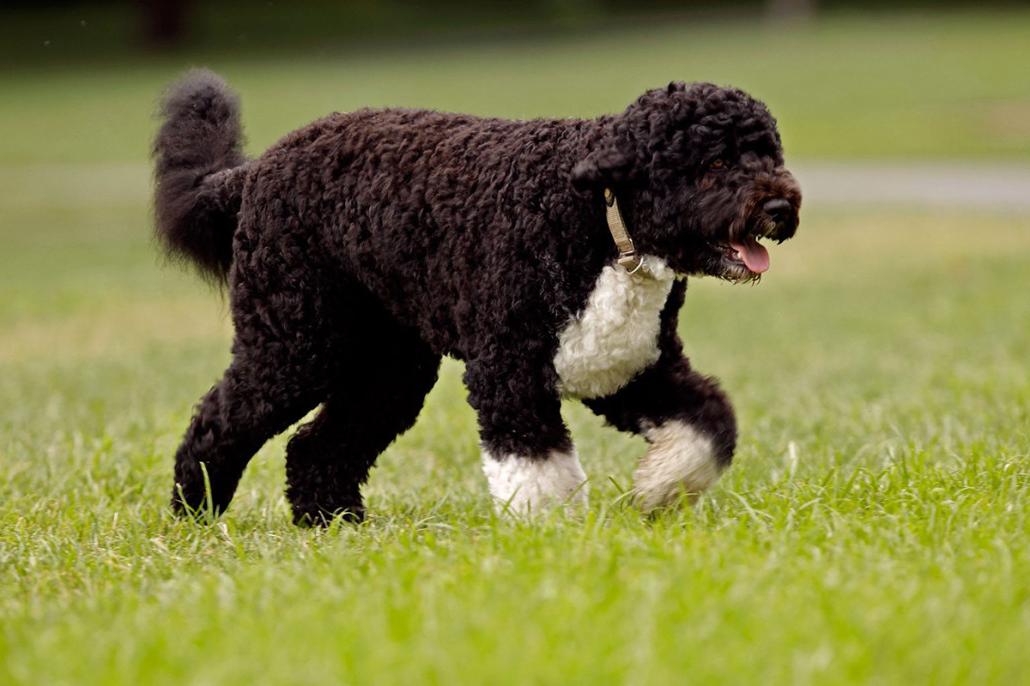- Breed Category: Working Group
- Country of Origin: Portugal
- Average Height: Males 50-57 cm, Females 43-52 cm
- Average Weight: Males 19-27 kg, Females 16-23 kg
- Average Life Span: 10-14 years
- Grooming Requirements: Regular brushing and trimming
- Exercise Requirements: High, needs daily exercise
- Coat Type: Curly or wavy
- Coat Color Variations: Black, white, brown, or combinations
- Shedding Level: Low
- Ear Type: Droopy
- Tail Type: Tapered, carried high
- Temperament: Energetic, intelligent, loyal
- Intelligence Level: High
- Barking Tendency: Moderate
- Compatibility with Children: Very good
- Compatibility with Other Pets: Generally good
- Training Ease: Highly trainable
- Common Health Issues: Hip dysplasia, PRA, GM1 storage disease
- Dietary Needs: High-quality dog food
- Energy Level: Very high
- Drooling Tendency: Low
- Sensitivity to Weather: Sensitive to extreme temperatures
- Overall Maintenance Level: Moderate to high
- Original Purpose: Fishing aid, water retrieval
- Year of Recognition by Kennel Clubs: 1983 (AKC)
- Famous Breed Representatives: Bo and Sunny Obama
- Apartment Friendly: Yes, with sufficient exercise
- Best Suited For: Active families, water activities
- Cost of Ownership: Moderate to high
- Unique Traits: Webbed feet, excellent swimmers
- Cultural Significance: Traditional Portuguese fishing dog
- Popularity Rank: Increasing in popularity
Ever found yourself wondering which dog breed would fit perfectly into your active lifestyle? The Portuguese Water Dog might just be the answer. Known for their intelligence and energetic nature, these dogs are more than just a pretty face. They have a rich history and unique characteristics that make them stand out.
Originating from the Algarve region of Portugal, these dogs were once the trusty companions of fishermen. They helped with tasks like herding fish into nets and retrieving lost gear. Their webbed feet and strong swimming ability made them invaluable at sea.
This article will dive into the breed’s fascinating history, distinctive traits, and essential care tips. Whether you’re considering adopting one or just curious, read on to learn more.
The Portuguese Water Dog: A Breed with a Rich Heritage

Early Development of the Breed
The Portuguese Water Dog has roots that trace back centuries, evolving alongside the fishing communities of Portugal. These dogs were bred for their strength, intelligence, and swimming prowess, making them perfect partners for fishermen. Over time, their skills were honed to assist in various maritime tasks, ensuring their place in the hearts of those who relied on the sea for their livelihood.
Role in Portuguese Fishing Communities
In the bustling fishing villages along Portugal’s coast, these dogs were more than just pets; they were essential crew members. Their ability to dive and swim with ease allowed them to herd fish into nets and retrieve items from the water. This unique role cemented their status as indispensable helpers, contributing significantly to the success of fishing expeditions.
Key Historical Figures in Preservation
As the fishing industry modernised, the breed faced the threat of decline. However, dedicated individuals like Vasco Bensaude, a Portuguese shipping magnate, played a crucial role in preserving the breed. His efforts in the early 20th century helped ensure that the Portuguese Water Dog would not fade into obscurity, but instead thrive and gain recognition worldwide.
Physical Characteristics
With a robust build and a distinctive curly or wavy coat, the Portuguese Water Dog is both striking and functional. Their webbed feet are a testament to their aquatic heritage, while their muscular frame supports their energetic and playful nature. These physical traits, combined with their keen intelligence, make them a standout choice for those seeking an active and loyal companion.
Appearance and Unique Traits

Distinctive Looks
The Portuguese Water Dog is a medium-sized breed, typically weighing between 16 to 27 kilograms. Their coat is one of their most striking features, coming in either curly or wavy textures. You’ll often see them in black, white, or brown, sometimes with distinctive markings like white patches on the chest or paws. This coat isn’t just for show; it’s water-resistant, perfect for their seafaring past.
Unique Physical Traits
One of the standout features of this breed is their webbed feet. These aren’t just for show—they’re built for swimming, making them natural-born water lovers. Their strong, muscular build supports their active lifestyle, allowing them to excel in various physical activities.
Temperament and Behaviour
Portuguese Water Dogs are known for their lively and spirited nature. They’re intelligent and eager to please, which makes training a breeze. These dogs thrive on companionship and are happiest when they’re part of the action, whether it’s a family outing or a day at the beach. Their playful and friendly demeanor makes them great with kids and other pets, too.
Personality and Suitability

Typical Personality Traits
Portuguese Water Dogs are renowned for their loyalty and intelligence. They form strong bonds with their families and are always eager to learn new things. Their high energy levels mean they love to be active, whether it’s a game of fetch or a swim in the ocean. This breed thrives on mental and physical stimulation, making them perfect for those who enjoy an active lifestyle.
Suitability as a Family Pet and Working Dog
These dogs are versatile, fitting well into both family and working environments. Their affectionate nature makes them excellent family pets, while their intelligence and work ethic make them ideal for various roles, from therapy dogs to search and rescue. They adapt well to different settings, provided they get enough exercise and mental challenges.
Interaction with Children and Other Animals
Portuguese Water Dogs are generally great with kids. Their playful and gentle nature means they can be trusted around children, making them a popular choice for families. They also get along well with other animals, especially if socialised from a young age. Their friendly disposition ensures they fit seamlessly into multi-pet households.
Training and Exercise Needs
Training a Portuguese Water Dog is usually straightforward due to their eagerness to please and quick learning ability. Consistent, positive reinforcement works best. Regular exercise is crucial; they need daily walks, playtime, and mental challenges to keep them happy and healthy. Without enough activity, they might become bored and develop unwanted behaviours.
Training, Exercise, and Health

Importance of Early Training and Socialisation
Getting a head start on training and socialisation is key for Portuguese Water Dogs. These dogs are smart and pick up on things quickly, so introducing them to different environments, people, and other animals early on helps them grow into well-rounded adults. It’s all about setting the stage for a confident and adaptable dog.
Recommended Training Techniques
When it comes to training, positive reinforcement is the way to go. These dogs respond well to praise, treats, and play. Keep sessions short and fun to maintain their interest. Consistency is crucial, so make sure everyone in the household is on the same page with commands and rules.
Daily Exercise Requirements and Activities They Enjoy
Portuguese Water Dogs are bundles of energy. They need daily exercise to keep them happy and healthy. Think long walks, swimming, or a good game of fetch. They also love activities that challenge their minds, like agility courses or puzzle toys. Keeping them active helps prevent boredom and the behaviours that come with it.
Health and Lifespan
These dogs are generally healthy, with a lifespan of around 10 to 14 years. Regular vet check-ups, a balanced diet, and plenty of exercise contribute to their well-being. Like any breed, they can be prone to certain health issues, so staying informed and proactive is important for their long-term health.
Health and Care for the Portuguese Water Dog

Common Health Issues
Portuguese Water Dogs are generally healthy, but like any breed, they can be prone to certain health issues. Hip dysplasia and progressive retinal atrophy are two conditions to watch out for. Regular vet check-ups can help catch these early, ensuring your furry friend stays in top shape.
Average Lifespan and Health Tips
With proper care, these dogs typically live between 10 to 14 years. To keep them healthy, provide a balanced diet, regular exercise, and mental stimulation. A happy dog is a healthy dog, so make sure they get plenty of playtime and affection.
Preventative Care Recommendations
Preventative care is key. Regular vaccinations, flea and tick prevention, and dental care are essential. Routine vet visits will help monitor their health and catch any potential issues early. Keeping an eye on their weight and ensuring they get enough exercise will also contribute to their overall well-being.
Grooming and Maintenance
Their curly or wavy coat requires regular grooming to prevent matting. Brushing a few times a week and occasional trims will keep their coat looking its best. Regular ear checks and cleaning are also important, as their floppy ears can be prone to infections.
Coat Care and Grooming Routines

Shedding and Seasonal Grooming Tips
Portuguese Water Dogs have a unique coat that requires regular attention. Their curly or wavy fur doesn’t shed much, but it can mat if not properly maintained. Brushing a few times a week is essential to keep their coat tangle-free and looking its best. During seasonal changes, you might notice a bit more shedding, so increasing the frequency of grooming sessions can help manage this.
Regular trims every couple of months will keep their coat in top condition. Pay special attention to their ears, as their floppy nature can lead to moisture build-up and potential infections. A quick check and clean during grooming sessions can prevent this.
Diet and Nutrition
A balanced diet is crucial for the health and vitality of a Portuguese Water Dog. High-quality dog food that meets their nutritional needs will support their active lifestyle. Look for foods rich in protein and healthy fats to maintain their energy levels and coat health. Fresh water should always be available, especially after exercise.
It’s also important to monitor their weight, as obesity can lead to health issues. Regular vet check-ups can help ensure they’re getting the right nutrients and maintaining a healthy weight. Treats are fine in moderation, but they should complement a balanced diet, not replace it.
Nutritional Needs and Feeding Tips
Foods to Include and Avoid
For optimal health, Portuguese Water Dogs need a diet rich in high-quality protein and healthy fats. Look for dog foods that list meat as the first ingredient. Omega-3 fatty acids are great for their coat and joint health, so consider fish-based options. Avoid foods with artificial additives, fillers, and excessive grains, as these can lead to allergies or digestive issues.
Feeding Schedules and Portion Recommendations
Consistency is key when it comes to feeding. Split their daily food intake into two meals to maintain energy levels and prevent bloating. Portion sizes depend on their age, weight, and activity level, so it’s best to consult with your vet for tailored advice. Always ensure fresh water is available, especially after exercise.
Fun Facts and Trivia
Did you know that Portuguese Water Dogs were once used to deliver messages between boats? Their intelligence and swimming skills made them perfect for the job. Also, they have a unique “lion clip” grooming style, which was historically used to keep their hindquarters warm while swimming. These dogs are truly fascinating, both in history and in their modern roles as beloved companions.
Interesting Tidbits and Famous Portuguese Water Dogs

Interesting Tidbits about the Breed
Portuguese Water Dogs have a fascinating history that goes beyond their fishing roots. Did you know they were once used to deliver messages between boats? Their intelligence and swimming skills made them perfect for the job. Another fun fact is their unique “lion clip” grooming style, which was historically used to keep their hindquarters warm while swimming. These dogs are truly versatile, adapting from working roles to being cherished family pets.
Famous Portuguese Water Dogs in Media or History
One of the most famous Portuguese Water Dogs is Bo, who belonged to former U.S. President Barack Obama. Bo became a household name, often seen accompanying the First Family and even making appearances at official events. His presence in the White House brought significant attention to the breed, highlighting their friendly and adaptable nature. Bo’s fame helped boost the popularity of Portuguese Water Dogs, showcasing them as ideal companions for families worldwide.
Final Thoughts

The Portuguese Water Dog is a remarkable blend of history and versatility. With their intelligence and energetic nature, they make excellent companions for active families. Their unique traits and rich heritage highlight the balance between their working past and modern adaptability. Embracing a Portuguese Water Dog means welcoming a loyal, spirited friend into your life. Consider this breed if you’re ready for an engaging and rewarding journey with a devoted canine partner.
